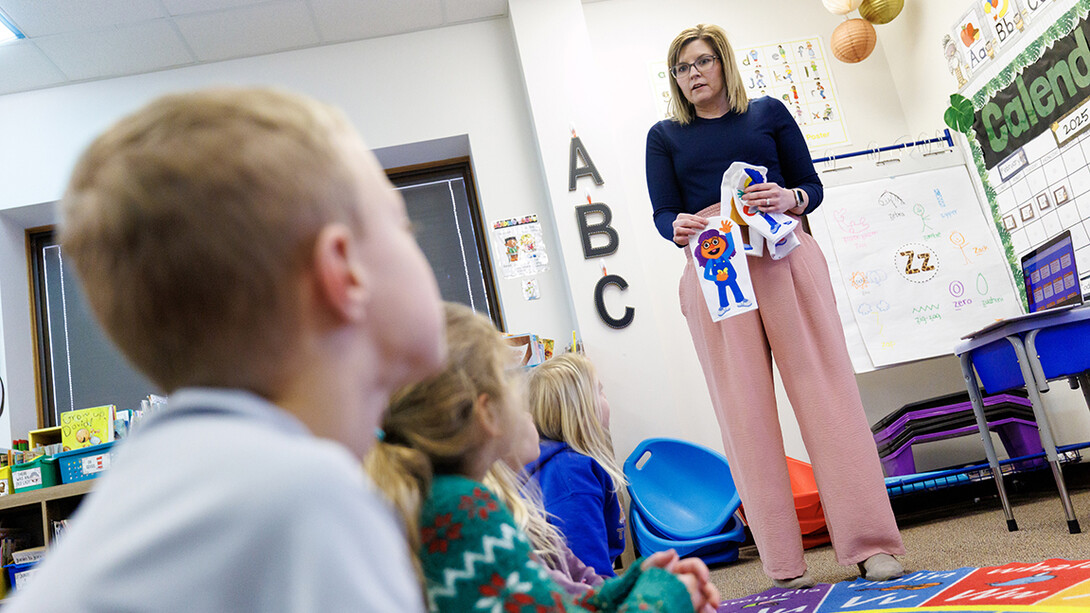Program helps children, teachers gain insight into social, emotional health

An early childhood intervention program offered through the University of Nebraska–Lincoln is expanding to make it easier for rural classrooms to access the social and emotional learning curriculum.
NEW INSIGHTS Into Children’s Temperament uses roleplaying and relatable characters to help young students learn about their emotions and those of classmates and friends. Nebraska’s incarnation is the first to update its virtual offerings, with video lessons transitioning to a virtual portal and other materials used for lessons also moving to a digital format. Angela Hinrichs, facilitator for the program through the Nebraska Center for Research on Children, Youth, Families and Schools, said INSIGHTS helps children learn about and process their emotions, improving the classroom environment.
“It helps give them a language,” she said. “Some might not have words for their emotions or actions. It’s a really kind way to reach the students, but it’s also a way to get them to physically practice behavior.”
INSIGHTS has operated in Nebraska since 2019 and is currently used in 24 kindergarten and first grade classrooms in 14 schools statewide. The program initially aimed to keep children with attention deficit hyperactivity disorder, oppositional defiant disorder and conduct disorders in the classroom with typically developing classmates. It has since expanded to include training coordinated by the center for all students, teachers and parents.
“The entire classroom’s math and reading scores went up,” Hinrichs said. “It brings me so much hope to see what a 10-week intervention like this can do for teachers, for kids’ learning and for families.”
INSIGHTS is based on research that identified the four most relevant dimensions of personality temperament for kindergarten and first grade classrooms. The program uses four characters to personify these temperament profiles. Students use puppets of the characters to play out scenarios and better understand how and why they and classmates react to classroom situations.
Brittney Gauthier, a kindergarten teacher at East Butler Grade School in Dwight, Nebraska, said INSIGHTS lessons can help with the classroom dynamics by inspiring them to be more considerate of each other’s emotions.
“It gets them to really identify other people’s feelings and get to know each other,” she said. “Especially in a small school, they think ‘I shouldn’t do this to my friend because they might not respond the way I would.’”
Coretta the Cautious is shy, tends to withdraw from stressful situations and voices her discomfort. Fredrico the Friendly is social and enjoys new experiences and new people. Gregory the Grumpy appears moody to others, reacts strongly to stress and has difficulty finishing tasks. Hilary the Hardworking enjoys getting things done and takes pride in her accomplishments. Students walk through “not helpful,” “kind of helpful” and “helpful” responses to the scenarios.

Kids connect with the characters and learn to relate emotions to how the characters would behave in a dilemma, Hinrichs said. It also makes the children feel more sympathetic toward classmates who are having a more difficult time.
“The students want to say Gregory is mean, but we reframe this,” Hinrichs said. “He can become exhausted doing things that are easy for others. At kindergarten and first grade levels, these kids might know they feel like one of the puppets, but they’re not able to analyze their behavior.”
Gauthier said she can see her students making connections between the lessons and their real lives. This makes the program more engaging than some other programs she has used, she said.
“They can see they know someone like Gregory the Grumpy, or someone that’s a little more shy,” Gauther said.
Hinrichs said the characters make students more comfortable, and they start opening up about things they are dealing with or feelings they are having.
“They confide in them or they create dramatic play situations that help them explore different situations,” Hinrichs said. “Teachers can put the puppets in the hands of their students, and they can re-enact struggles they’re having in the classroom. Students can project some of the issues they’re having onto the puppets and act them out. It’s a great tool for teachers.”
Teachers also learn more about their students through this process, making it easier for them to connect with, support and teach the children.
“Teachers begin to understand that maybe in a stressful situation, a child high in withdrawal will maybe just shut down, or if plans unexpectedly get changed, someone high in negative reactivity, that might be a game changer for their whole day,” Hinrichs said. “Teachers begin to predict student behavior or can come alongside students and provide support at a different level.”
Gauthier said it helped her recognize patterns in her students, which helped her better prepare for and respond to negative behavior in the classroom.
“As a teacher, it helped me realize how they might react to certain situations or problems and help them problem solve,” she said.
A better understanding of their emotions and personalities helps the children form better relationships and react to stress in healthier ways, Hinrichs said.
“You know you’re setting a student up for success not just in these early childhood years, but in their future academic years,” she said. “If you have these self-regulation skills, it’s going to go a long way for your future success, from family dynamics to how you’re able to perform in a career.”
link








